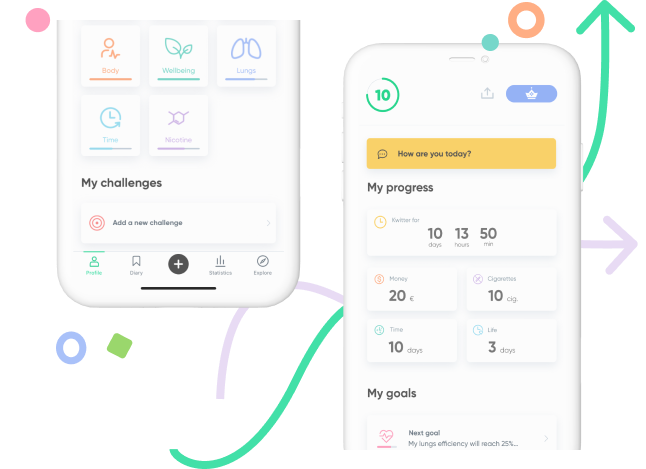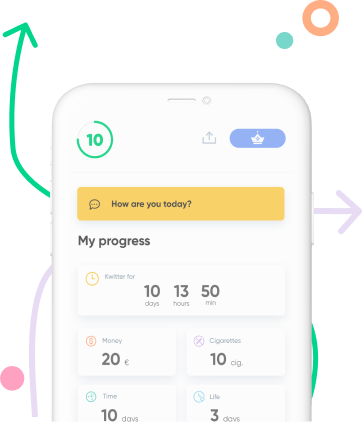February 3, 2022
News
World Cancer Day: Kwit Raises Cancer Awareness
Today marks World Cancer Day. Discover #CloseTheCareGap and encourage prevention, detecting and treating cancer.
Like every year, the International Union Against Cancer organizes a world awareness day worldcancerday.org for this disease that affects nearly 20 million people each year. You don't have to know anything about smoking to know that it is a major cause of cancer. That said, this World Cancer Day is an opportunity for Kwit to renew its commitment to this disease and for its users'health.
Why is tobacco a risk factor for cancer?
Let's go back to some biology basics. Your body is made up of organs, which are made up of tissues, which are themselves a collection of cells. Cells are the building blocks of the body. As you probably know, our cells are regularly renewed: some die and others are created from existing cells. The cells contain our genetic matter in their nucleus which contains all needed information for our bodies to properly function: This is actually DNA. But why are we talking about DNA? cancer is characterized by the presence of tumors: these are clusters of cells that have failed copying DNA during their production.
The probability of DNA falling to copy itself can be increased by the influence of several factors, including:
Prolonged unprotected exposure to sunlight or artificial UV light,
repeated exposure to X-rays or radioactive substances,
active or passive smoking.
Beyond lung cancer, which is a type of cancer that is most frequently associated with smoking or being exposed to tobacco smoke, is actually a risk factor that favors the development of around twenty other types of cancers. More than 45, 000 French people die every year from tobacco related cancers. But we can act to avoid these deaths!
Better late than never
As the old saying goes, it's better late than never! However, healthcare and prevention access don't go hand in hand. As we know, many factors interfere with health care access. This is why this year's theme, World Cancer Day, promotes fairer care.
For example, in refugee populations, cancer is diagnosed relatively late which means that the disease is detected at a delayed stage. This slows the treatment process, leading to many health complications. Childhood cancer survival rates are over 80% in high-income countries, but as low as 20% in low-income countries. Age, gender identity, sexual orientation, socio - professional status, financial affluence, location, etc. are all factors likely to promote or delay an easy healthcare access and therefore impact the prognosis of a disease.Indeed, at all stages of tobacco use, it is possible to act together to promote the creation of a healthier environment for all!We are all key players, we have the power to act, let's take advantage of it!
How is Kwit involved in the fight against cancer ?
There are several levels of prevention to avoid health deterioration and people's well-being.
Primary prevention consists of preventing the onset of disease: In the case of tobacco-related cancers, the goal is to prevent people from taking up smoking. Unfortunately, the scope of public action does not reach every part of the population, and it is often the most vulnerable who are left out. This is why other actors also have their role to play: Kwit helps your smoking behavior to decrease by guiding you through smoking cessation, so the youngest will be less and less exposed to it and it will be less and less "normal". We know that being exposed to tobacco smoke early in life or simply seeing one's parents smoke are risk factors for wanting take up smoking. Kwit intervenes to help smokers quit and to help those around them avoid smoking.
Secondary prevention consists of detecting a disease early in order to manage it effectively . Here again, many obstacles may exist for access to the diagnostic process factors likely to promote or delay entry into care, depending on where you live or your socio -professional situation. It is much easier to access a cancer screening center when you are financially well off and live in a city area than when you are in a precarious situation and live in an area with few health professionals . To overcome these difficulties, Kwit offers health education and awareness -raising content on the dangers of smoking and the benefits of quitting, with its blog, webinars, support groups on social networks and readings in the application .
Tertiary prevention is about avoiding complications from a disease that has occurred . It may be common to think that once a cancer is diagnosed, it would be too late to stop smoking . But think again !Recent studies show that quitting smoking after a cancer diagnosis improves your chances of survival and decreases your risk of complications! However, it is sometimes difficult for healthcare professionals to address this issue factors that may promote or delay the start of treatment after a diagnosis is made. Here again, Kwit partners with healthcare professionals to help manage smoking among cancer patients by offering free access to our Premium version of Kwit to cancer centers. With our smoking cessation preparation program based on cognitive and behavioral methods, Kwit gives you all the tips and tricks to succeed this challenge! Quitting smoking is beneficial at every stage of cancer!
We've made sure that our Kwit app has a free version available internationally, in 15 languages, including English, Spanish, Russian, Portuguese... and many others to help and support people like you on their journey to quit smoking. World Cancer Day is very important to Kwit, as we know that some of our users have cancer and we want to make sure that we show our support and fight together!
The benefits of quitting smoking with Kwit
On your Kwit dashboard, you can motivate yourself to stay smoke-free by tracking the progress of various wellness and health indicators. Carbon monoxide, cardiorespiratory capacity, life expectancy, etc.
You will indeed gain many years of life expectancy by quitting smoking, but there are also quick results that occur, such as your senses returning to normal completely. Or being able to walk up the stairs without having to stop halfway, completely out of breath. Incredible, isn't it? Your body automatically rejects the impact that nicotine once had on you and that sets you free to make your own decisions, trust the process.
Remember, quitting smoking doesn't deprive you of anything. On the contrary, quitting smoking offers you a new life, free of addiction, and with less risk of developing serious and preventable diseases. That's why Kwit is proud to be at your side to work toward a smoke-free society.
You too, show your commitment to this cause and relay this article on social networks using the keyword #CloseTheCareGap!
Kwit's best tips to quit smoking
Keep in mind the reason why you decided to quit smoking, remind yourself that it is normal to relapse and not have everything perfectly planned out as a daily routine. Although, this could also be a good idea to motivate yourself to set your personal challenges. This can also be done by writing your goals down in a journal or with our Kwit app.
It's never too late to start your journey, don't compare yourself to other users who have quit smoking for 2 years for example, you can take that as motivation and be inspired by them but don't think their journey was easy. They also went through the highs and lows of withdrawal. click here to follow one of our Kwitters journey .
Congratulate yourself for small victories: there is no such thing as a small win, whether you are thinking about quitting or whether you have managed to stop smoking for 2 years. At Kwit, we are big fans of telling you how proud we are of you and of your progress!
Feel free to join Instagram for more tips on quitting smoking.




